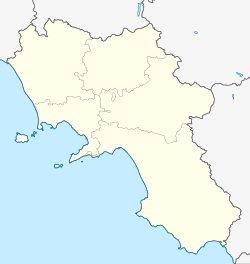Vietri sul Mare
Vietri sul Mare | |
|---|---|
| Comune di Vietri sul Mare | |
 View of Vietri sul Mare | |
 Coat of arms | |
 Vietri sul Mare within the Province of Salerno | |
show Location of Vietri sul Mare | |
 Vietri sul Mare Location of Vietri sul Mare in Italy | |
| Coordinates: 40°40′N 14°44′E / 40.667°N 14.733°E | |
| Country | Italy |
| Region | Campania |
| Province | Salerno (SA) |
| Frazioni | Albori, Benincasa, Dragonea, Iaconti, Molina, Raito, San Vincenzo |
| Government | |
| • Mayor | Marcello Civale |
| Area | |
| • Total | 9.52 km2 (3.68 sq mi) |
| Elevation | 80 m (260 ft) |
| Population | |
| • Total | 7,793 |
| • Density | 820/km2 (2,100/sq mi) |
| Demonym(s) | Vietresi (Dialect: Vietraiuli) |
| Time zone | UTC+1 (CET) |
| • Summer (DST) | UTC+2 (CEST) |
| Postal code | 84019 |
| Dialing code | 089 |
| Patron saint | St. John the Baptist |
| Saint day | 24 June |
| Website | Official website |
Vietri sul Mare ("Vietri on the Sea"; Campanian: Vietre) is a town and comune in the province of Salerno, in the Campania region of southern Italy. It is situated just west of Salerno, separated from the Port of Salerno by only a harbour wall.[4] The town is known for its polychrome ceramics, a tradition since at least the 15th century,[5] and is considered to be the gateway to the Amalfi Coast.[6]
The main landmark is the Church of St. John the Baptist, a late Neapolitan Renaissance style building with a high bell tower. There are numerous buildings displaying ceramics, including the Museo Provinciale della Ceramica in the nearby village of Raito.
Geography[]
The town is bordered by Cava de' Tirreni, Cetara, Maiori and Salerno. The quarter by the sea, named Marina di Vietri is located to the south of the town. The other hamlets (Italian: frazioni) are , , (including the localities of Iaconti and San Vincenzo) and .
Main sights[]
The principal church in Vietri sul Mare is the Church of St. John the Baptist, a late Neapolitan Renaissance style building with a high bell tower. A previous church dated from the 10th century. It contains a coffered gold ceiling, a 17th-century marble altar, an alabaster statue of the Saint, and an 11th-century wooden crucifix. The Confraternity of the Annunciation and the Rosary dates to the 17th century and is noted for its facade decorated with pottery. Other notable churches include the 16th century Church of the Madonna delle Grazie in Raito, the Church of Santa Margherita in Albori and the Church of Santa Maria delle Grazie in Benincasa.[5]
The Palazzo Solimene was built after World War II by Paolo Soleri, and houses ceramic collections. The Palazzo Taiani is noted for its dovecote tower, which was once used to watch out for Saracens during raids.[5] The nearby village of Raito contains the Museo Provinciale della Ceramica.[7]
Notable people[]
- Antonio Carluccio, chef
- Antonio Forcellino, historian
- Antonio Savastano, opera singer
- Germano Benencase (Benincasa), composer, musician and conductor
- Giuseppe Prezzolini, writer, honoured citizen
References[]
- ^ "Superficie di Comuni Province e Regioni italiane al 9 ottobre 2011". Istat. Retrieved 16 March 2019.
- ^ "Popolazione Residente al 1° Gennaio 2018". Istat. Retrieved 16 March 2019.
- ^ Data from Istat
- ^ Google (4 January 2017). "Vietri sul Mare" (Map). Google Maps. Google. Retrieved 4 January 2017.
- ^ Jump up to: a b c "Vietri sul Mare". Amalficoast.com. Retrieved 4 January 2017.
- ^ Touring Club of Italy (2004). Italy by Bike: 105 Tours from the Alps to Sicily. Touring Editore. p. 178. ISBN 978-88-365-2938-4.
- ^ Ponzi, Mauro (2008). Spazi di transizione: il classico moderno (1888-1933) (in Italian). Mimesis Edizioni. p. 37. ISBN 978-88-8483-609-0.
External links[]
![]() Media related to Vietri sul Mare at Wikimedia Commons
Media related to Vietri sul Mare at Wikimedia Commons
- Vietri sul Mare at Amalfiguide.it
- Cities and towns in Campania
- Municipalities of the Province of Salerno
- Amalfi Coast
- Campanian geography stubs



